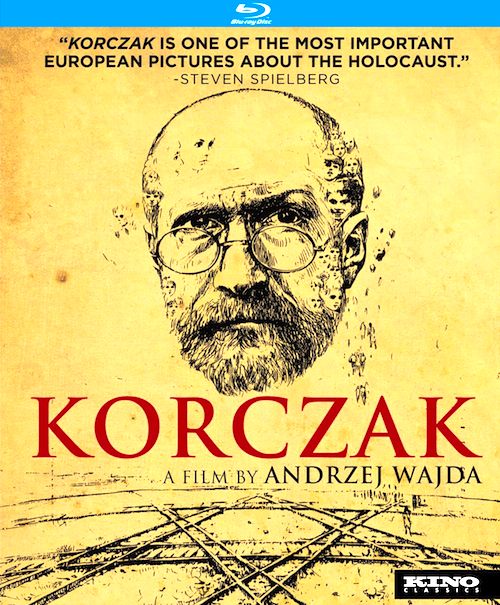By Joe Bendel. Janusz Korczak was like the Polish Dr. Seuss, Dr. Spock, and Father Flanagan combined. He was born Henryk Goldszmit—a name that would prove fatal during the National Socialist occupation. Master Polish director Andrzej Wajda became one of his first filmmaking countrymen to forthrightly address the Holocaust, following the brave example of his protégé and frequent screenwriter Agnieszka Holland with 1990’s Korczak, which is now available on DVD and Blu-ray from Kino Classics.
Korczak/Goldszmit devoted his life to children. He was a popular children’s author and radio broadcaster, whose show was rather summarily canceled in the late thirties for sadly obvious reasons. Though removed from the public eye, Korczak continued to serve his beloved children as the benevolent headmaster of a progressive orphanage. A gentle gentleman by nature, Korczak loyally served as a doctor in the Polish Army, but nobody would have mistaken him for a military man. Yet, as the Germans marched through the streets, he refused to relinquish his uniform when so many others did. As viewers soon see, Korczak always did things the honorable way—the hard way.
Part of the agony of Korczak is watching the good doctor and his associates refusing to believe the situation is as bad as viewers know it is. Of course, the scale and systemization of the National Socialist death machine still remain hard to process. Yet, by 1942, enough escapees had sent word back to the ghetto that most of the involuntary residents would have a general idea what to expect from the concentration camps. Nonetheless, despite offers of counterfeit papers, Dr. Korczak refuses to leave his children. He had no use for one fake passport. He would need over two hundred.
 Many have identified Korczak as a significant inspiration for Spielberg’s Schindler’s List. Shrewdly, the DVD cover prominently displays his unqualified endorsement. While both films profile heroic individuals, Korczak has absolutely no sentimental uplift to placate shallower viewers. It ends as it ended. Nonetheless, Wajda, again filming a Holland screenplay, ventures into more expressionistic territory in his final scene, perhaps representing idyllic afterlife not so strongly defined in the Judaic tradition Korczak never closely identified with (a stylistic decision Wajda took some heat for at the time of its initial release).
Many have identified Korczak as a significant inspiration for Spielberg’s Schindler’s List. Shrewdly, the DVD cover prominently displays his unqualified endorsement. While both films profile heroic individuals, Korczak has absolutely no sentimental uplift to placate shallower viewers. It ends as it ended. Nonetheless, Wajda, again filming a Holland screenplay, ventures into more expressionistic territory in his final scene, perhaps representing idyllic afterlife not so strongly defined in the Judaic tradition Korczak never closely identified with (a stylistic decision Wajda took some heat for at the time of its initial release).
Wojciech Pszoniak gives one of the defining performances of the immediate post-Communist era. Yes, the Korczak viewers initially meet seems impossibly kind and virtuous. Yet, as the doctor endures pain and humiliation for the sake of his charges, Pszniak makes his anguish vividly clear. Being a saint is trying burden.
Korczak also boasts a talented ensemble cast of pre-teen actors. Their complex relationships with each other feel very real and human. Conversely, those of Korczak’s colleagues are not as well established. Still, Ewa Dalkowska has some touching moments as Stefa Wilczynska, a former Korczak alumnus, who returned from the safety of “Palestine” to assist the doctor and his children during their hour of need.
Robby Müller’s black-and-white cinematography is absolutely arresting. Its influence on Schindler is unmistakable. Despite the deliberate lack of on-screen horrors, it is a draining film to watch. It is also exactly the sort of story that would have been impossible to depict under the recently deposed Communist regime, which had steadfastly relegated the Holocaust to the Orwellian memory hole. Along with his visceral Katyn, Korczak represents an important burst of creative truth telling from Wajda and Holland. Highly recommended, it is now on-sale at all major online retailers.
Posted on August 18th, 2012 at 2:40pm.